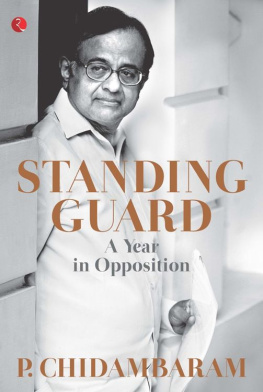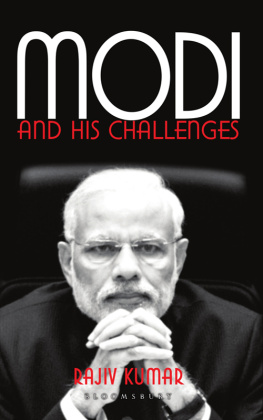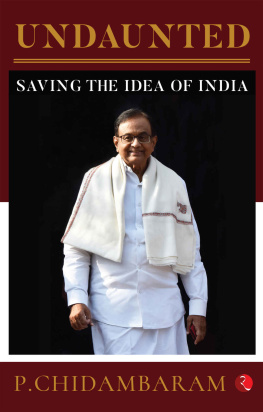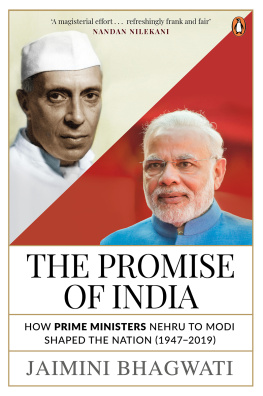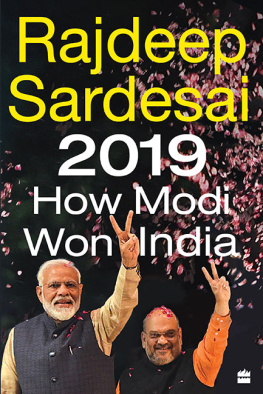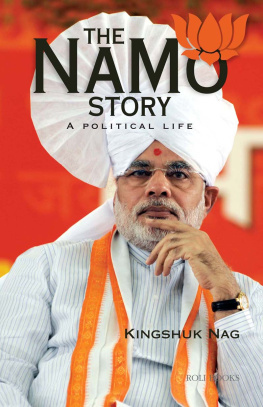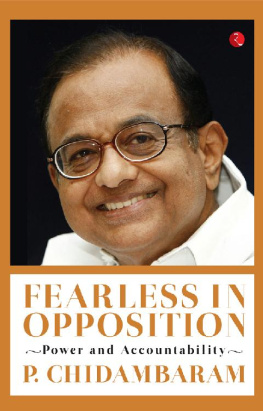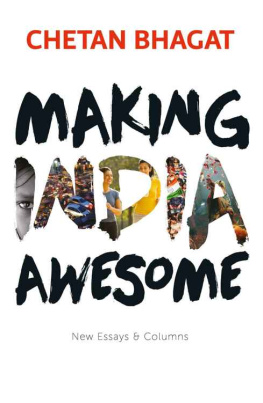STANDING GUARD
STANDING
GUARD
A YEAR IN OPPOSITION
P. Chidambaram

Published by
Rupa Publications India Pvt. Ltd 2016
7/16, Ansari Road, Daryaganj
New Delhi 110002
Copyright P. Chidambaram 2016
The views and opinions expressed in this book are the authors own and the facts are as reported by him which have been verified to the extent possible, and the publishers are not in any way liable for the same.
All rights reserved.
No part of this publication may be reproduced, transmitted, or stored in a retrieval system, in any form or by any means, electronic, mechanical, photocopying, recording or otherwise, without the prior permission of the publisher.
ISBN: 978-81-291-3962-7
First impression 2016
10 9 8 7 6 5 4 3 2 1
The moral right of the author has been asserted.
This book is sold subject to the condition that it shall not, by way of trade or otherwise, be lent, resold, hired out, or otherwise circulated, without the publishers prior consent, in any form of binding or cover other than that in which it is published.
CONTENTS
BY Y.V. REDDY
BY MONTEK SINGH AHLUWALIA
FOREWORD
Y.V. Reddy
former Governor, Reserve Bank of India
The practitioner asks the economist, What is to be done? A pure theorist may feel he is not competent to advise since what is to be done in a specific situation is never a simple corollary of theoretical conclusions. It is well known that economists themselves differ even on technical issues. There is the problem of facts with reference to which theories have to be considered and prescriptions for action formed.
As Sir Alec Cairncross, a former Chief Economic Adviser to the UK Treasury put it in the Richard T. Ely Lecture (1985), The facts are usually obscure, disputed, seen through different eyes against a different experience of life and stretching far beyond the limited economic context within which the economist seeks to analyze them.
The theorist is in control of his starting point and is free to make his own assumptions on it. The focus of the practitioner is relatively more specific. Apart from the possible delays in getting data, one has to reckon with the rewriting of the preliminary estimates into final estimates.
In a way, for the practitioner, particularly in India, on a real-time basis, not merely the future but even the past is uncertain. So some approximations or judgements become inevitable. Economic relationships keep changing, and in recent years they are changing faster than ever before.
We are described as argumentative Indians. But, what are we arguing about? Are they the most important and urgent? How do we divide our time and energy between measuring poverty and doing something about it?
There is also the issue of non-economic factorsparticularly, institutional and legal factors. The practitioner of public policy has to weigh the political consequences of alternative policy actions, and their timing. For an economist, appeal of economic reform is self-evident but a practitioner of public policy has to be convinced that good economics is also good politics. It is in that context that the exposition of good economics by a practitioner is of exceptional value.
Practitioners of public policy in India have written memoirs more as an explanation, if not in defense, of the events in the past, than as an agenda for debate. Mr Palaniappan Chidambaram has been unique among them in expressing his opinions on a range of burning issues of contemporary importance in a systematic and coherent manner whenever he had a window of opportunity of being out of public office. This volume, a collection of essays, is his second book of this genre.
This collection of essays suggests a list of subjects that require our attention, the issues that need to be deliberated, and the policy alternatives that ought to be considered. They reflect, despite inevitable political bias, Mr Chidambarams clarity of expression, mastery over detail, command over data, and understanding of electoral politics as well as institutional dynamics in reconciling the desirable, the feasible and the purposeful. They provide clues to the complex links between economics and politicssomething that only an intelligent insider to both can appreciate, but will be expressed freely only when he happens to become an outsider.
While there could be many views on the subjects discussed in the volume, Mr Chidambaram brings forth his admirable skills to persuade the reader. For my part, I benefit from reading what he writes, just as I learnt many things in my interactions with him in the past, as assistant, as adviser, and as a member of the team in the practice of public policy.
This volume commends itself for its treatment of contemporary issues drawing from Mr Chidambarams extensive experience of over three decades in national politics and high-level economic policy-making. Bon aperitif.
6 February 2016
FOREWORD
Montek Singh Ahluwalia
former Deputy Chairman, Planning Commission, Government of India
P. Chidambaram has played a stellar role in Indian politics and policy-making. It has been a privilege for me to work with him in different capacities over the past twenty-five years. Over these years, I have seen for myself his first-rate, razor-sharp mind and his extraordinary capacity to master complex issues, going into minute details of all aspects of a problem, while keeping the larger picture constantly in mind. He also has the rare ability to balance multiple, and at times conflicting issuessocial, political and economicwhich is an essential requirement for a politician in a vibrant and plural democracy such as ours. Having done the balancing, Chidambaram also has the capacity to come to a firm decision, to own it fully, and then defend and explain the decision to those unconvinced, whether in Parliament or outside.
Chidambaram once said to me that by sitting in Delhi one cannot fathom how government schemes actually worked in the field and how they were viewed by those for whom they were designed. He invited me to accompany him on a days tour of his constituency, Sivaganga, to get a first-hand exposure. The tour gave me a new perspective. I also got to appreciate how demanding it was for him to serve as Finance Minister and also be a conscientious MP, visiting his remote constituency as often as he did. Getting to Sivaganga involved a three-hour journey by air from Delhi to Chennai, followed by an hour by plane to Madurai, and then several hours of touring by car. He had to do this over the weekend before returning to a mountain of files which he usually cleared in record time.
Since he lived politics and policy when in office, my wife Isher was curious to know how he spent his time when he was not an MP during the term of the first NDA government. He replied that a period out of office was actually very valuable for a politician, because it provided an opportunity to rethink stated positions, and especially reflect on why so many well-intentioned policies often failed to deliver. In his last stint out of office, he wrote a series of columns in the Indian Express that were later published as a book. Writing for a newspaper has its own benefits, providing a vehicle for a broader dissemination of ideas and also testing out new ideas. This is his second volume of collected columns written over twelve months in 2015.
The 51 articles published here cover a wide range of subjects including governance, the economy, policy and programs, politics, legislation and foreign policy. As a leading member of the Congress Party, Chidambaram is obviously not writing from a politically neutral perspective, but these columns are also not written as an official party spokesperson. There is no political posturing and grandstanding, both of which have a legitimate role in the theatre of politics, especially in the cut and thrust of parliamentary debate, or on election platforms. Instead, we have a series of highly readable columns, of about 900 words each, dealing with issues that were topical at the time of writing, and many of which remain so even today.
Next page
